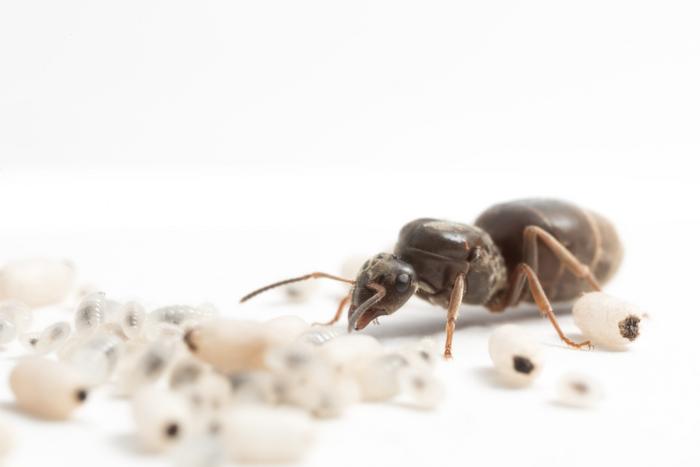The queens in colonies of social insects, such as ants, bees, and wasps, are considered the veritable embodiment of specialization in the animal kingdom. The common perception is that the queen’s only task is to lay eggs – and that this attribute is an inherent trait, not influenced by external factors. In contrast, recent research undertaken at Johannes Gutenberg University Mainz (JGU) has demonstrated that in certain ant colonies the social environment can play a crucial role in shaping the behavioral specialization of the queens. “With regard to the ant species we studied, it is social factors that control whether queens become specialized or not. Our findings challenge the widely accepted notion of social insect queens as inherently specialized egg-laying machines,” stated Dr. Romain Libbrecht.

Credit: photo/©: Romain Libbrecht
The queens in colonies of social insects, such as ants, bees, and wasps, are considered the veritable embodiment of specialization in the animal kingdom. The common perception is that the queen’s only task is to lay eggs – and that this attribute is an inherent trait, not influenced by external factors. In contrast, recent research undertaken at Johannes Gutenberg University Mainz (JGU) has demonstrated that in certain ant colonies the social environment can play a crucial role in shaping the behavioral specialization of the queens. “With regard to the ant species we studied, it is social factors that control whether queens become specialized or not. Our findings challenge the widely accepted notion of social insect queens as inherently specialized egg-laying machines,” stated Dr. Romain Libbrecht.
The research was conducted by the Reproduction, Nutrition, and Behavior in Insect Societies group at JGU under the supervision of Dr. Romain Libbrecht, an evolutionary biologist. The corresponding paper has recently been published in Functional Ecology. Dr. Romain Libbrecht currently works at the Centre National de la Recherche Scientifique (CNRS) in the Insect Biology Research Institute of the University of Tours.
Concept of insect societies as superorganisms consisting of specialized individuals
It is generally assumed that social insect colonies consist of queens that monopolize reproduction and sterile workers responsible for all non-reproduction-related tasks, such as the care of the brood, i.e., eggs and larvae. Libbrecht’s team now questioned this basic assumption. They focused on ant species where the queens found new colonies alone and without the help of workers. “Interestingly, these founding queens are not yet specialized in terms of their behavior at this stage of their lives,” Libbrecht pointed out. “They themselves assume all tasks in the nest, such as brood care, to ensure successful production of the first generation of workers.”
In their experiments, Libbrecht’s group studied the black garden ant Lasius niger that is native to Germany. They found the social environment to be a core factor in determining the behavioral specialization of founding queens. “The introduction of workers in the nests of founding queens suppressed the natural predisposition of the queens to look after their brood themselves. And, conversely, when we isolated queens specialized in egg-laying from their workers, they rapidly reverted to the brood care behavior observed in the case of founding queens, even after many years of specialization.”
Revision of the accepted view of the division of labor in insect societies
Libbrecht emphasized that the behavior observed during the study challenges the traditional view of social insect queens as being intrinsically specialized in egg production. Instead, the findings demonstrate that the presence of workers not only triggers the egg-laying specialization of queens but also actively maintains it in established colonies. The discovery of such social control of queen specialization may reshape our understanding of the functioning of insect societies and their division of labor.
Romain Libbrecht was head of the Reproduction, Nutrition, and Behavior in Insect Societies group at the Institute of Organismic and Molecular Evolution (IOME) at Johannes Gutenberg University Mainz from 2016 to 2022. Since 2023, he has been a researcher at the Insect Biology Research Institute at the CNRS of the University of Tours. He is particularly interested in examining how organisms adjust their reproduction, physiology, and behavior in response to environmental conditions.
Related links:
- https://evo.bio.uni-mainz.de/forschungsgruppen/gruppe-libbrecht/ – Reproduction, Nutrition, and Behavior in Insect Societies group at the JGU Institute of Organismic and Molecular Evolution (IOME)
- https://www.blogs.uni-mainz.de/fb10-biologie-eng/about-the-faculty-of-biology/institutes/institute-of-organismic-and-molecular-evolution-iome/ – Institute of Organismic and Molecular Evolution (IOME) at the JGU Faculty of Biology
Read more:
- https://press.uni-mainz.de/the-advantage-of-genetic-diversity-more-diverse-ant-colonies-raise-more-offspring/ – press release “The advantage of genetic diversity: More diverse ant colonies raise more offspring” (28 Sept. 2021)
- https://press.uni-mainz.de/ant-responses-to-social-isolation-resemble-those-of-humans/ – press release “Ant responses to social isolation resemble those of humans” (7 Apr. 2021)
- https://press.uni-mainz.de/arms-race-between-ant-societies-gene-activity-in-defenders-depends-on-invading-slavemaking-ants/ – press release ” Arms race between ant societies: Gene activity in defenders depends on invading slavemaking ants” (28 Feb. 2019)
- https://press.uni-mainz.de/a-study-of-ants-provides-information-on-the-evolution-of-social-insects/ – press release “A study of ants provides information on the evolution of social insects” (10 Sept. 2018)
Journal
Functional Ecology
DOI
10.1111/1365-2435.14536
Article Title
Ontogeny of superorganisms: Social control of queen specialization in ants
Article Publication Date
25-Mar-2024




